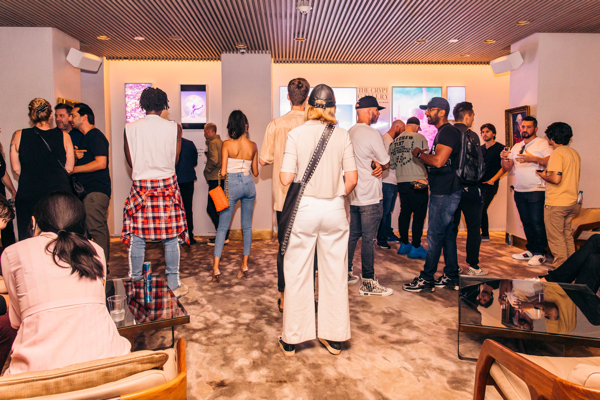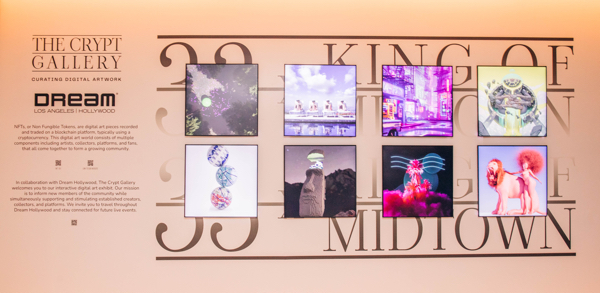How NFTs Can Revolutionize Hotel Stays – HOTELSMag.com
At the Dream Hotel in Hollywood, California, the energy in the lobby is electric, literally, thanks to an eye-catching gallery of NFT artwork adorning the walls. As one of the first places in the world to feature an NFT art gallery, carried out in collaboration with The Crypt Gallery of New York, The Dream takes the model of a static hotel art program and turns it on its head.
Contributed by Julianna Shallcross
More than half of the hotel lobby is occupied by LED frames of various sizes, each offering a cornucopia of constantly cooing digital art. Each artwork has a QR code, which takes viewers to an NFT marketplace. There they can buy the artwork, store it in their digital wallet and view it on their own devices. For those unfamiliar with non-fungible tokens, The Dreams gallery also educates visitors about how NFTs work.

Dream Hollywood General Manager Vaughn Davis believes NFTs are just the tip of the iceberg when it comes to attracting a new generation of consumers, as well as a new way of doing business.
“It’s a whole new transitional environment,” Davis said of using NFTs to shift the hospitality world from Web 2 to Web 3. “NFT is not just a buzzword. The whole landscape has changed.”
But unlike social media where hotels can easily cultivate a following through pretty pictures, the NFT community is not easily impressed. Hotels can’t just drop an NFT and expect to make waves. Nor should they release an NFT that is just a work of art. It must have utility and experience behind it.
“The NFT community is so tight-knit right now that you get yelled at if you walk into the wrong space,” said Tommy Farr, CEO of Metaverse Hospitality, a digital consulting firm. Rather, Farr suggested hotels dive deep into understanding the NFT community through discussions on Twitter Spaces and research on Web 3 tools and cryptocurrencies, before looking at business opportunities.
“I think research and education is still huge right now, so you don’t have to release an NFT project next week,” Farr added. “It’s a good time, but you have to do it right.”
When a hotel decides to drop an NFT, Davis suggested building something that lives forever, not a one-time NFT like giving buyers of an NFT artwork a room package at the hotel. “It shouldn’t be a one-time thing,” Davis said. “It defeats the purpose of maintaining something on the blockchain versus actually using the underlying technology to create something that is unique.”

In addition to selling NFTs in the lobby, The Dream created his social club where gaining membership requires the purchase of a limited edition NFT designed by Perry Cooper. That NFT provides members with real benefits at the hotel such as use of the house car, access to the Gunnar Peterson gym and room discounts, along with metaverse benefits. This NFT has utility in the form of hotel services, but it can also be resold, much like other NFTs.
“The members love the hotel as it is, and now they have a cool piece of art that was created by Perry Cooper and has trending value,” explained Davis. “So if they ever decide to sell this art, they’re profiting from the membership.”
But NFTs should go beyond art, said Simone Puorto, CEO of Travel Singularity, a technology-focused consultancy. In fact, any part of a hotel experience can be turned into an NFT – a stay package, a piece of furniture in the room or lobby, or a group dinner at the hotel restaurant. These transactions then remain on the blockchain where it is decentralized, immutable and impossible to forge.
“It’s not just about art or a JPEG; it’s more about creating a smart contract every time we do something,” said Puorto. “NFTs are just the shiny part, you know, that’s what we see, and because there’s a lot of money involved. But that’s only one part, and it’s not even the most interesting part.”
CitizenM Hotels announced a virtual hotel in The Sandbox, a gaming platform in the Metaverse, which would be built through the sale of 2,000 NFTs, which would also provide owners with real-world rewards such as room discounts and free drinks. Owners of the NFTs would even get to vote on the next location for a real CitizenM hotel.

Casa de Campo, a luxury resort in the Dominican Republic, recently partnered with a new booking platform, Pinktada, to use Room Night Tokens (RNTs) for stays where guests will receive NFTs after their stay is complete. These tokens act as tickets to specific rooms in hotels. They can be used by guests or exchanged or even resold within the Pinktada platform. The tokens are not cryptocurrency per se, but they act like one. The NFTs issued are digital highlights and memories of the guest’s stay.
Jason Kycek, Casa de Campo’s senior vice president of sales and marketing, sees Pinktada as the Web3 equivalent of the online travel agencies of the dot-com era, but one that can help hotels enter this complex digital space.
“These guys are first to market with this new technology that’s going to build your platform on blockchain technology. That’s the rails,” Kycek said of Pinktada’s Web 3 applications. “And they’re not only using that technology, but then incorporating The NFT part in it.”
Farr believes NFTs could also be used in a hotel’s loyalty program or act as room keys, those with valuable art attached. Still, there is a lot to figure out with the use of NFTs and blockchain technology in the hospitality space, as the downturn in the crypto world recently pointed out. But the changes will continue to happen faster than anything that has come before. “We’re still so early,” Farr said. “There are going to be pivots monthly, weekly, annually.”


